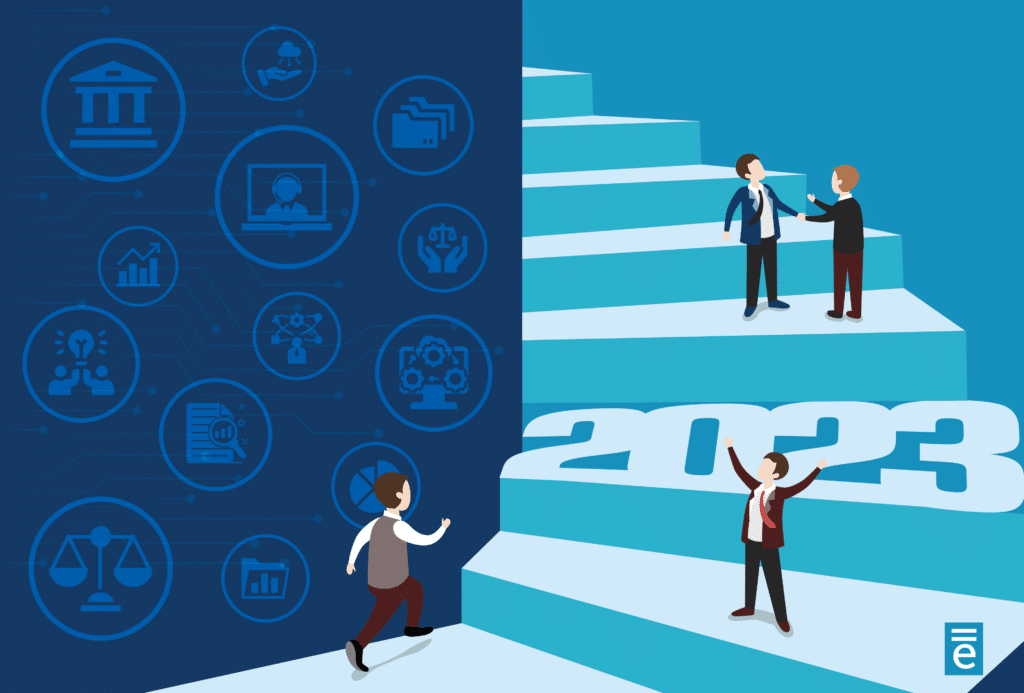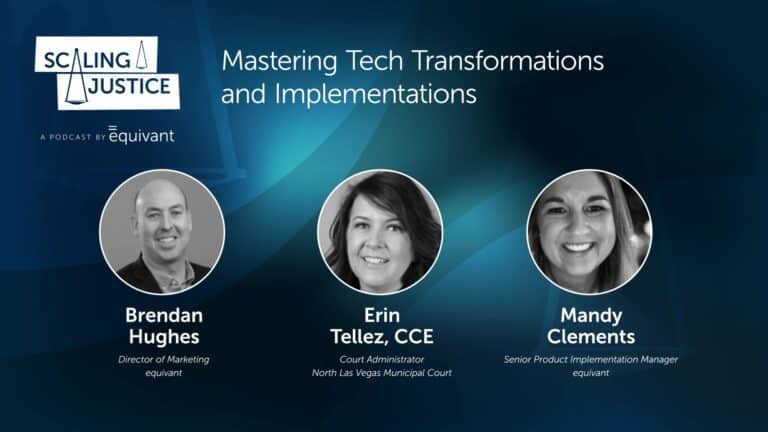Equity, access, and transparency are at the heart of the upgrades we recommend for the new year.
By Gary Egner, Director, Business Development
It’s not news that the past three years have been a whirlwind for courts. They rose to the challenge of the pandemic, recommitted to advancing racial justice, and adopted a slew of new technologies more quickly than ever. As we look ahead to 2023, the most important trends will be carryovers and continuations of the forces that have shaped court technology for the past few years. Here’s what my crystal ball shows:
1. Ensuring that technology helps underserved communities equitably access court services remains a high priority.
For starters, courts and their tech partners must make using mobile devices (not just laptops and desktops) easier for people at all stages of justice proceedings. Community members should be able to learn about, manage, and track their cases, submit documents and e-signatures (where allowed), attend virtual hearings, and pay fines and fees on their phones or tablets.
At equivant, we’ve committed to developing mobile applications that can handle the complexity and sophistication of court workflows — because we believe it’s of utmost importance for courts to meet the needs of their communities. We’re also promoting automation as a justice solution. The capabilities already built into equivant’s CMS can help court administrators automate everyday processes, reduce bottlenecks, and advance justice for more people. We’re ready to help more courts combine workflow tactics and technology to improve their efficiency and avoid errors that sidetrack justice.
2. Technology vendors will keep helping courts get smarter about virtual services.
We’ve made much progress since the pandemic forced courts nationwide to go fully virtual nearly three years ago. When courts used meeting platforms like Zoom and Microsoft Teams for the first time during the global crisis, they weren’t thinking about how to integrate their existing technology. Things have improved since then. These days, equivant’s CMS can seamlessly integrate with virtual hearings. Now, we’re working with courts on document signature routing and other ways to do more electronically.
Most courts aren’t going fully virtual; they’re taking a hybrid approach. In 2023, we’ll be working with courts to tie their in-person and e-functions together and reduce redundancies. Ultimately, we want to enable courts to work more efficiently and give community members the best options to access court services.
3. The rise in self-represented litigants, or SRLs, will continue to require the justice system’s full attention.
More and more Americans can’t afford attorneys and end up representing themselves in legal proceedings. The Self-Represented Litigation Network estimates 60% of people in civil cases go to court without representation. The issue most deeply impacts low-income Americans, who do not get adequate legal help for most of their pressing legal problems.
People without lawyers deserve fair treatment, transparent legal processes, and support navigating the justice system. When courts streamline systems and use technology to automate them, self-represented people benefit from smoother processes that are easier to understand. Mobile technology also plays a role in improving access for people without lawyers. Courts will continue to need to put in place supports like easy-to-understand, step-by-step processes, online help desks that walk people through what they need to do, and tech support for virtual proceedings. Courts will also need to make sure they work out the kinks of document submission, make scheduling easy, and offer tools like automated reminders for deadlines and court dates.
Courts can’t offer legal advice, of course, but easing the process is a big step toward ensuring justice for those without lawyers.
4. Proponents of National Open Court Data Standards (NODS) will keep beating the drum for court adoption.
In 2020, the Conference of State Court Administrators and the National Center for State Courts (NCSC) released a set of standards for court data. The standards aim to increase data consistency and quality from court to court and make misinterpreting court data less likely—so it’s in the courts’ interest to adopt them! But when I spoke on a panel at eCourts, NCSC’s annual tech conference, in Las Vegas this past December, only half the audience raised their hands when I asked if they knew about NODS.
So, the challenge in 2023 will be to make more courts aware of what NODS is and what they gain by adopting the standards: more transparency, better ability to collaborate with partner agencies, and higher quality data about the workings of justice in their communities.
5. Demand for accurate, consistent case statistics is here to stay.
Advocates such as the nonprofit Measures for Justice have rightly called for more transparency and consistency in the way courts across the nation measure and report data about demographics, types of charges, and outcomes. Researchers, policymakers, the media, and the public also want to have faith that court data can usefully describe gaps in justice and the experiences of people who interact with the system. Then courts, legal service providers, technology providers, and others can work to provide equitable access.
Adopting NODS will help courts meet increasing demands for data, and equivant offers a unique “middleware” tool that maps a court’s data to that of any agency or system they need to exchange data with.
It’s a bit of a relief to look forward to “more of the same” this year. But even if a new, unforeseen crisis shook the world of courts, we’d be ready to support them in any way we can.
About Gary Egner
equivant, Director of Business Development
With more than 30 years of experience in the justice and public safety sectors in software application development, technical management, and project management, Gary Egner is a leading authority in helping courts and justice agencies serve their communities. Mr. Egner helps courts to navigate an often confusing and convoluted IT and software environment.
Focused on forward-thinking solutions and modernizing the industry, Mr. Egner has been a member of the IJIS Court Advisory Committee and numerous committees with the National Council of Juvenile and Family Court Judges. He also sits on the NIEM Open Governance Board and has participated on numerous standards committees with the National Center for State Courts (NCSC), leading efforts to bring national data protocols and standards to the justice industry.




